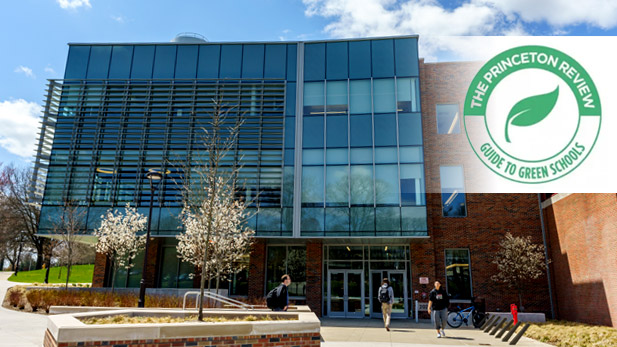Sustainability Efforts Put Rose-Hulman on ‘Green’ Colleges List

The New Academic Building’s WELL Certification is one of several aspects of sustainability and energy efficiency that helped the institute earn inclusion in The Princeton Review’s 2023 Guide to Green Colleges.
Rose-Hulman has been named one of America’s top “Green” colleges for its strong commitment to the environment through sustainability campus policies, programs, and practices.
The Princeton Review cites Rose-Hulman in the 2023 edition of the Guide to Green Colleges, a listing culminated after collecting data from the company’s surveys of administrators and students attending the colleges. More than 25 data points were analyzed in the selection of schools for the guide.
“We have had an institute-wide commitment to sustainability for several years and this Green Colleges listing is recognition of those extraordinary efforts by our administration, faculty, staff, and students to have a healthy campus environment and leave the world a better place,” said President Robert A. Coons. “Our continued commitment to sustainability and energy efficiency can be found throughout campus in our buildings, academic programs, and student activities.”
The New Academic Building became Indiana’s first building to earn full WELL Certification from the International WELL Building Institute (IWBI) for design and technology that enhances the health, wellness, and human experience. The 70,000-square-foot, $29 million building, opened for the 2021-22 school year, met all IWBI WELL v1 Certification performance requirements regarding air, water, nourishment, light, fitness, comfort, and mind features that impact human health and well-being. Other academic and residence life buildings have been designed or redesigned with an emphasis on sustainability and energy efficiency.
Meanwhile, the Department of Chemistry and Biochemistry became Indiana’s first higher education institution to adopt a Green Chemistry Commitment that’s incorporating green chemistry theory and practice into classes, continuously improving green chemistry accessibility, and educating students that will develop a sustainable future.
Also, courses in other engineering and science academic departments are introducing students to implement design concepts with sustainable materials and little or no impact to the environment. An Introduction to Sustainability course being taught in the Department of Humanities, Social Sciences, and the Arts will have students traveling to Belgium and the Netherlands during Spring 2023 to visit historic windmills and state-of-the-art wind farms, world-class solar farms, and greenhouses that cover the countryside of the two European countries. The students also will meet scientists, engineers, activists, and experts from climate and eco-power cooperatives and car-sharing initiatives.
On campus, members of the Engineers for a Sustainable World student organization maintain a community garden as part of their passion for environmentalism and drive to make the world, and campus, a more sustainable place. And, for the last four years, Rose-Hulman has been recognized with the Tree Campus Higher Education designation by the Arbor Day Foundation for its continued commitment to effective urban forest management and engaging students, faculty and staff members in conservation goals. Nearly 250,000 trees spread throughout the institute’s 1,300-acre campus.